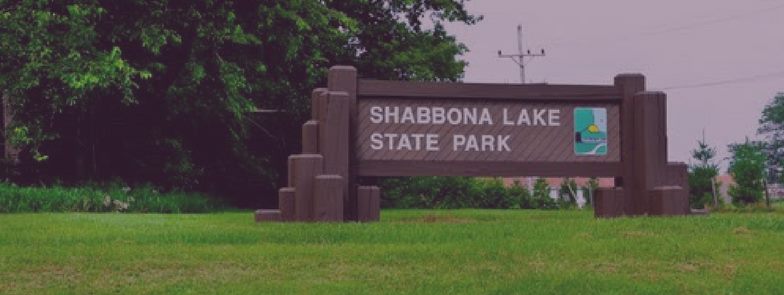
- Details
- By Levi Rickert
More than 175 years ago, in the 1830s, Chief Shab-eh-nay left his Reservation in northern Illinois to visit his family in Kansas. While he was away, the U.S. government illegally auctioned off more than 1,280 acres of his land near what is now the village of Shabbona in southern DeKalb County.
Today, in a historic act typically requiring congressional approval, Illinois Governor JB Pritzker signed into law a bill transferring an entire state park to the Prairie Band Potawatomi Nation—restoring a portion of its stolen land.
“This moment reflects the power of collaboration and the shared desire to build a future rooted in justice and respect,” Prairie Band Potawatomi Chairman Joseph “Zeke” Rupnick said. “Illinois has shown true courage and vision by leading the way in the Land Back movement, demonstrating that healing and reconciliation are possible.”
Shabbona Lake State Park sits on the Nation’s original Reservation land in southern DeKalb County. Under the new law, the Prairie Band Potawatomi Nation will reclaim the park, pledging to keep it open to the public and enhance its infrastructure. The Nation will now work with the state to finalize a Land Management Agreement.
While some homes remain within the original Reservation boundaries, the legislation ensures that only the state park land is returned to the Prairie Band, leaving homeowners unaffected. Currently, deeds for these homes include a clause recognizing the rights and claims of Chief Shab-eh-nay’s descendants. Plans are underway to introduce federal legislation that would remove this clause, assuring homeowners of clear title to their properties.
“We extend our heartfelt thanks to the bill’s sponsors, state Sen. Mark Walker (D-Arlington Heights), state Rep. Will Guzzardi (D-Chicago), Senate President Don Harmon, House Speaker Emanuel “Chris” Welch, the Illinois Department of Natural Resources, and Governor JB Pritzker’s administration for their unwavering support,” Rupnick said. “We look forward to building a future of partnership and mutual respect with the state of Illinois. We are proud to once again call this land home.”
For nearly two centuries, the Prairie Band Potawatomi Nation has fought for federal recognition of its Reservation and rightful claim to the land. In 2001, the U.S. Department of the Interior confirmed that the Shab-eh-nay Reservation remains federally recognized Indian Country—since the U.S. government never obtained the required congressional approval to sell it.
The Nation has been deprived of its land’s cultural, social, and economic benefits since the 1830s. Still, it remains committed to preserving and improving Shabbona Lake State Park for all visitors.
“Returning our land is a necessary step toward the recognition we deserve as a people and as citizens of Illinois,” Rupnick said.
Despite being built on Native land, Illinois had no federally recognized Tribes until last year, when a portion of the Prairie Band’s lands were placed in trust. On April 19, 2024, the U.S. Department of the Interior placed sections of the Shab-eh-nay Reservation in trust for the Nation, making it the only federally recognized Tribal Nation in Illinois.
Over the past two decades, the Prairie Band Potawatomi Nation invested $10 million to repurchase lands within the original Reservation boundaries. By placing the land into trust, the Nation has transferred legal land titles to the U.S. government, ensuring the land is recognized as “Indian Country” under federal, state, and Tribal jurisdiction.
More Stories Like This
Native News Weekly (August 25, 2024): D.C. BriefsNavajo Nation Gaming Enterprise Marks Problem Gambling Awareness Month With $3.4M in Support
Cheyenne River Youth Project to Celebrate Women’s Strength at Barbie-Themed Passion for Fashion on March 14
Celebrating Native American Women
Native Bidaské: The Illusion of Freedom and the Myth of America 250, Leonard Peltier Speaks Out
Help us defend tribal sovereignty.
At Native News Online, our mission is rooted in telling the stories that strengthen sovereignty and uplift Indigenous voices — not just at year’s end, but every single day.
Because of your generosity last year, we were able to keep our reporters on the ground in tribal communities, at national gatherings and in the halls of Congress — covering the issues that matter most to Indian Country: sovereignty, culture, education, health and economic opportunity.
That support sustained us through a tough year in 2025. Now, as we look to the year ahead, we need your help right now to ensure warrior journalism remains strong — reporting that defends tribal sovereignty, amplifies Native truth, and holds power accountable.
 The stakes couldn't be higher. Your support keeps Native voices heard, Native stories told and Native sovereignty defended.
The stakes couldn't be higher. Your support keeps Native voices heard, Native stories told and Native sovereignty defended.
Stand with Warrior Journalism today.
Levi Rickert (Potawatomi), Editor & Publisher


